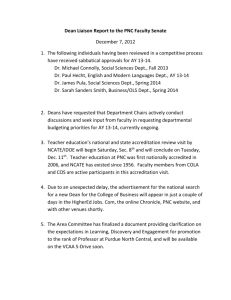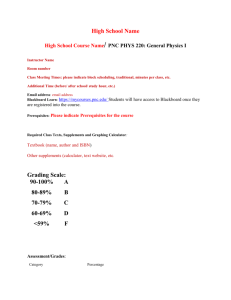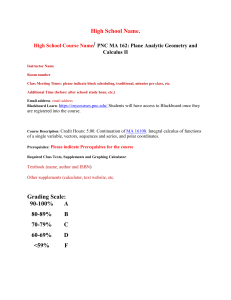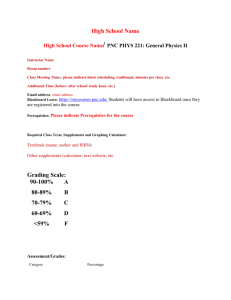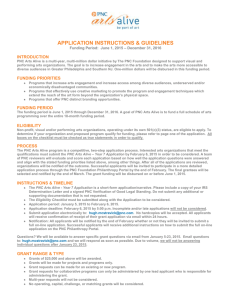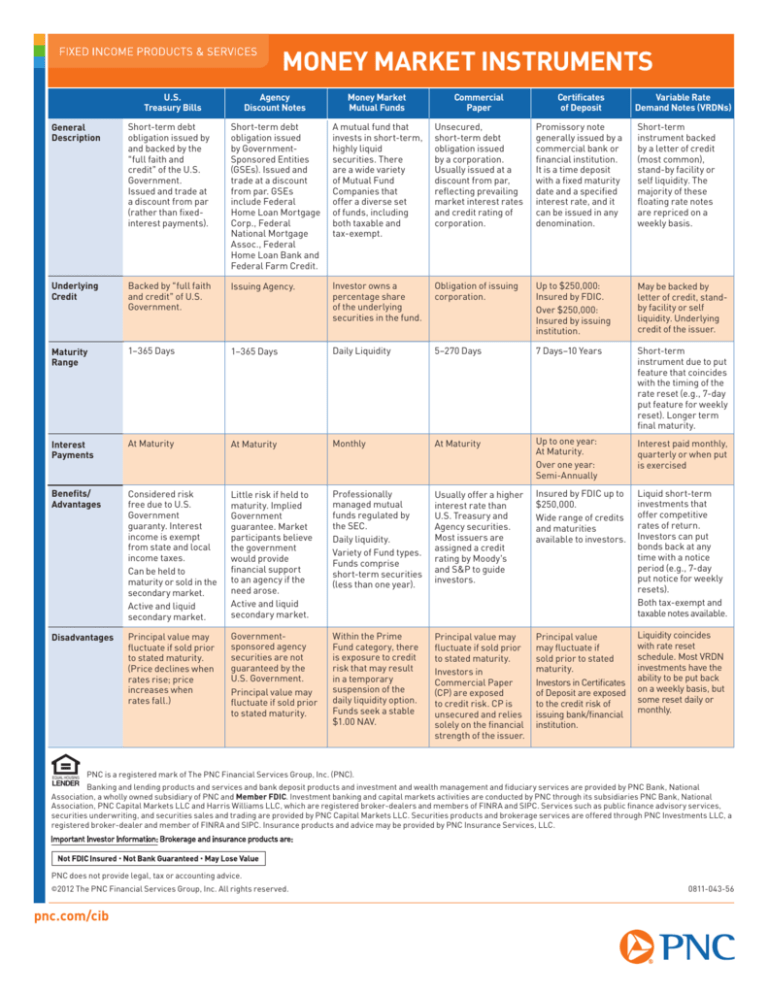
MONEY MARKET INSTRUMENTS
Agency
Discount Notes
Money Market
Mutual Funds
Commercial
Paper
Short-term debt
obligation issued by
and backed by the
“full faith and
credit” of the U.S.
Government.
Issued and trade at
a discount from par
(rather than fixedinterest payments).
Short-term debt
obligation issued
by GovernmentSponsored Entities
(GSEs). Issued and
trade at a discount
from par. GSEs
include Federal
Home Loan Mortgage
Corp., Federal
National Mortgage
Assoc., Federal
Home Loan Bank and
Federal Farm Credit.
A mutual fund that
invests in short-term,
highly liquid
securities. There
are a wide variety
of Mutual Fund
Companies that
offer a diverse set
of funds, including
both taxable and
tax-exempt.
Unsecured,
short-term debt
obligation issued
by a corporation.
Usually issued at a
discount from par,
reflecting prevailing
market interest rates
and credit rating of
corporation.
Underlying
Credit
Backed by “full faith
and credit” of U.S.
Government.
Issuing Agency.
Investor owns a
percentage share
of the underlying
securities in the fund.
Maturity
Range
1–365 Days
1–365 Days
Interest
Payments
At Maturity
Benefits/
Advantages
Disadvantages
General
Description
◊
U.S.
Treasury Bills
Certificates
of Deposit
Variable Rate
Demand Notes (VRDNs)
Promissory note
generally issued by a
commercial bank or
financial institution.
It is a time deposit
with a fixed maturity
date and a specified
interest rate, and it
can be issued in any
denomination.
Short-term
instrument backed
by a letter of credit
(most common),
stand-by facility or
self liquidity. The
majority of these
floating rate notes
are repriced on a
weekly basis.
Obligation of issuing
corporation.
Up to $250,000:
Insured by FDIC.
Over $250,000:
Insured by issuing
institution.
May be backed by
letter of credit, standby facility or self
liquidity. Underlying
credit of the issuer.
Daily Liquidity
5–270 Days
7 Days–10 Years
Short-term
instrument due to put
feature that coincides
with the timing of the
rate reset (e.g., 7-day
put feature for weekly
reset). Longer term
final maturity.
At Maturity
Monthly
At Maturity
Up to one year:
At Maturity.
Over one year:
Semi-Annually
Interest paid monthly,
quarterly or when put
is exercised
Considered risk
free due to U.S.
Government
guaranty. Interest
income is exempt
from state and local
income taxes.
Can be held to
maturity or sold in the
secondary market.
Active and liquid
secondary market.
Little risk if held to
maturity. Implied
Government
guarantee. Market
participants believe
the government
would provide
financial support
to an agency if the
need arose.
Active and liquid
secondary market.
Professionally
managed mutual
funds regulated by
the SEC.
Daily liquidity.
Variety of Fund types.
Funds comprise
short-term securities
(less than one year).
Usually offer a higher
interest rate than
U.S. Treasury and
Agency securities.
Most issuers are
assigned a credit
rating by Moody’s
and S&P to guide
investors.
Insured by FDIC up to
$250,000.
Wide range of credits
and maturities
available to investors.
Liquid short-term
investments that
offer competitive
rates of return.
Investors can put
bonds back at any
time with a notice
period (e.g., 7-day
put notice for weekly
resets).
Both tax-exempt and
taxable notes available.
Principal value may
fluctuate if sold prior
to stated maturity.
(Price declines when
rates rise; price
increases when
rates fall.)
Governmentsponsored agency
securities are not
guaranteed by the
U.S. Government.
Principal value may
fluctuate if sold prior
to stated maturity.
Within the Prime
Fund category, there
is exposure to credit
risk that may result
in a temporary
suspension of the
daily liquidity option.
Funds seek a stable
$1.00 NAV.
Principal value may
fluctuate if sold prior
to stated maturity.
Investors in
Commercial Paper
(CP) are exposed
to credit risk. CP is
unsecured and relies
solely on the financial
strength of the issuer.
Principal value
may fluctuate if
sold prior to stated
maturity.
Investors in Certificates
of Deposit are exposed
to the credit risk of
issuing bank/financial
institution.
Liquidity coincides
with rate reset
schedule. Most VRDN
investments have the
ability to be put back
on a weekly basis, but
some reset daily or
monthly.
PNC is a registered mark of The PNC Financial Services Group, Inc. (PNC).
Banking and lending products and services and bank deposit products and investment and wealth management and fiduciary services are provided by PNC Bank, National
Association, a wholly owned subsidiary of PNC and Member FDIC. Investment banking and capital markets activities are conducted by PNC through its subsidiaries PNC Bank, National
Association, PNC Capital Markets LLC and Harris Williams LLC, which are registered broker-dealers and members of FINRA and SIPC. Services such as public finance advisory services,
securities underwriting, and securities sales and trading are provided by PNC Capital Markets LLC. Securities products and brokerage services are offered through PNC Investments LLC, a
registered broker-dealer and member of FINRA and SIPC. Insurance products and advice may be provided by PNC Insurance Services, LLC.
PNC does not provide legal, tax or accounting advice.
©2012 The PNC Financial Services Group, Inc. All rights reserved.
pnc.com/cib
0811-043-56

